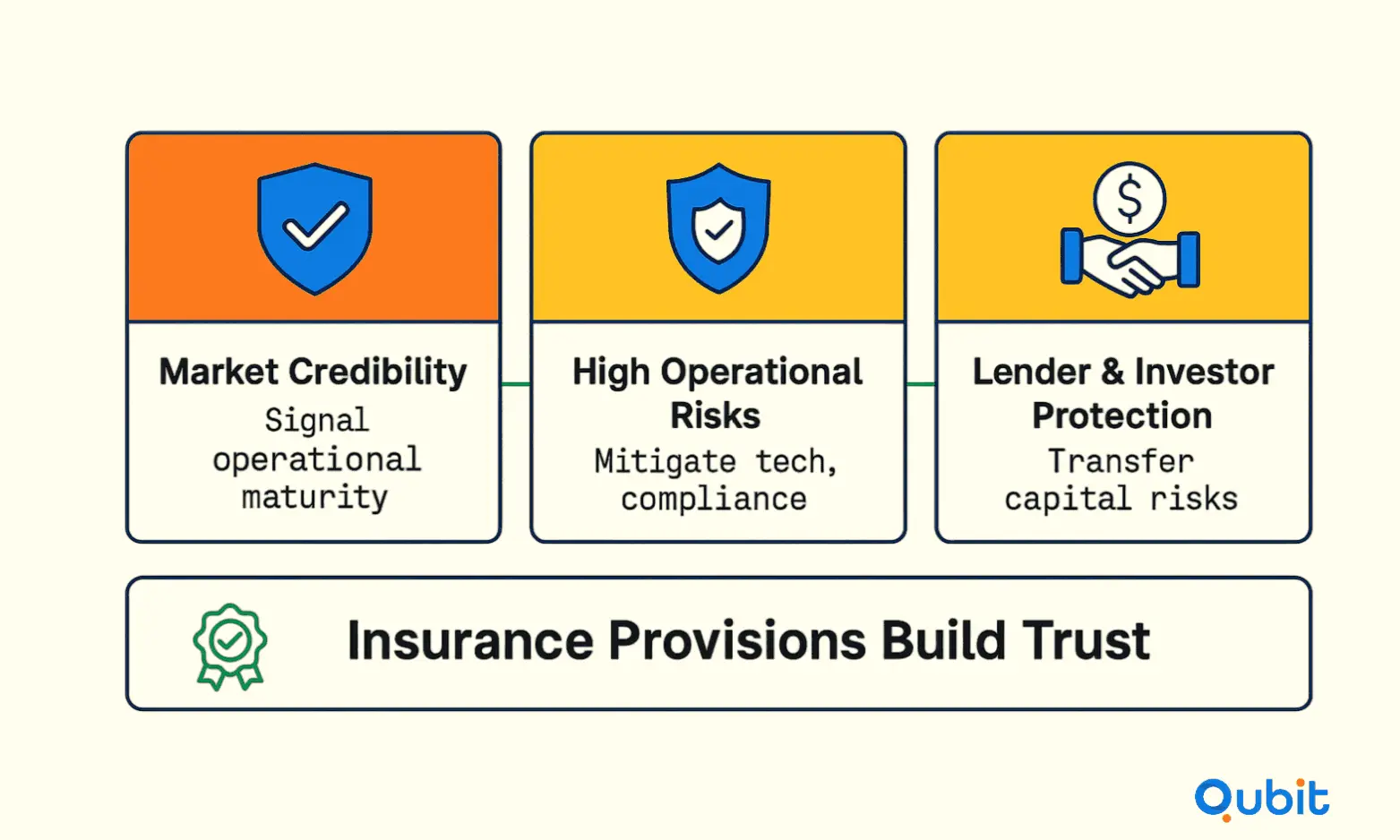For insurtech startups, debt financing is often a smart way to fuel growth without heavy equity dilution. Yet, maintaining compliance with debt covenants, especially insurance-related ones, is non-negotiable. Lenders use these covenants to protect their downside, and a breach can trigger immediate repayment, restrict future borrowing, or even force a renegotiation of your loan terms. As a founder, you should treat insurance compliance as a strategic pillar, not just a checkbox.
In 2024, over 68% of insurtech startups reported that insurance-related debt covenants influenced their financing terms significantly. This trend reflects the growing importance lenders place on insurance compliance as part of their due diligence and ongoing risk management. This article dives deep into the nuances of maintaining insurance policies to meet debt covenants, with practical tips, real-world examples, and internal resources to help you navigate this complex landscape.
Let's jump right in!
Why Insurance Covenants Matter in Debt Agreements for Insurtech Startups
Debt covenants are contractual promises embedded in loan agreements. They ensure that the borrower maintains certain financial and operational standards. Among these, insurance covenants require startups to carry specific insurance policies with defined coverage limits and terms.

For insurtech startups, these covenants are especially critical because:
- Market Credibility: Maintaining required insurance signals operational maturity and risk awareness, which can positively impact valuation and investor confidence.
- High Operational and Regulatory Risks: Insurtechs operate at the intersection of technology and insurance regulation. Risks include data breaches, regulatory fines, and technology failures.
- Investor and Lender Protection: Insurance policies transfer risk away from lenders and investors, protecting their capital in case of unforeseen events.
Financial Stability: Insurance coverage ensures that claims or losses do not jeopardize your ability to repay loans.
Common Types of Insurance Covenants in Debt Agreements
Understanding the typical insurance requirements lenders impose helps you prepare effectively. Below are the most common insurance covenants insurtech startups encounter:
1. Coverage Type and Minimum Limits
Lenders specify the types of insurance you must maintain and the minimum coverage limits. Typical policies include:
- Cyber Liability Insurance: Covers losses from data breaches, ransomware, and cyberattacks. For insurtech startups, this is often mandatory given the sensitive data handled.
- Directors & Officers (D&O) Insurance: Protects your leadership team from personal liability related to management decisions.
- Errors & Omissions (E&O) or Professional Indemnity Insurance: Covers claims arising from professional errors or negligence in advisory or algorithmic services.
- General Liability Insurance: Protects against bodily injury or property damage claims.
- Key Person Insurance: Covers financial loss if a critical founder or executive is incapacitated or passes away.
- Regulatory Liability Insurance: Protects against fines and penalties due to regulatory breaches.
Minimum coverage limits typically scale with your loan size and risk profile. For example, a lender might require $3 million in cyber liability coverage for a $10 million loan.
2. Naming the Lender as Additional Insured or Loss Payee
Lenders usually require to be named as:
- Additional Insured: Grants the lender direct rights under the insurance policy.
- Loss Payee: Ensures that insurance payouts related to collateral or assets go directly to the lender.
This protects lenders’ interests and ensures they receive compensation first in case of a claim.
3. Proof of Insurance and Ongoing Reporting
You must provide:
- Certificates of insurance (COIs) annually or upon renewal.
- Broker’s letters confirming compliance.
- Immediate notification of any material changes, cancellations, or claims.
Failure to provide timely evidence can be treated as a covenant breach.
4. Non-Invalidation Clauses
These clauses protect lenders if you miss premium payments or inadvertently breach policy terms, ensuring the policy remains valid for the lender’s benefit.
For a detailed breakdown of compliance strategies, see insurance compliance & covenant management.
The Impact of Breaching Insurance Covenants
Breaching insurance covenants is a serious issue with immediate financial and operational consequences:
- Loan Acceleration: The lender can demand immediate repayment of the outstanding loan amount.
- Default Triggers: Breaches can trigger defaults, allowing lenders to impose penalties, increase interest rates, or restrict further borrowing.
- Balance Sheet Impact: Under accounting standards like IFRS, breached covenants may require reclassification of long-term debt as current liabilities, affecting your financial ratios and investor perception.
- Funding Delays: Breaches can stall or derail future fundraising rounds due to perceived risk.
Real-World Example
In 2023, an insurtech startup faced a $5 million loan default after a cyber insurance policy lapsed unnoticed. The lender accelerated repayment, forcing the startup to seek bridge financing at unfavorable terms. This incident underscores the importance of proactive insurance management.
Best Practices for Maintaining Insurance Policies to Meet Debt Covenants
Maintaining compliance requires a disciplined, proactive approach. Here are actionable steps to help you stay on track:
1. Align Insurance Coverage with Lender Requirements
- Review your loan agreement carefully for specific insurance clauses.
- Work with insurance brokers experienced in insurtech to tailor policies.
- Ensure coverage limits meet or exceed lender minimums.
- Regularly benchmark your policies against industry standards and peer startups.
2. Correctly Name Lenders on Policies
- Understand the difference between additional insured, loss payee, and composite insured status.
- Composite insured status offers the strongest protection for lenders, allowing them to claim directly even if you default.
- Confirm with your insurer that lender naming is correctly documented.
3. Automate Renewal and Premium Tracking
- Use digital tools or policy management software to track renewal dates and premium payments.
- Set automated reminders well ahead of renewal deadlines.
- Consider multi-year policies to reduce renewal risks.
4. Maintain Transparent and Timely Reporting
- Prepare and submit COIs and broker letters promptly.
- Notify lenders immediately about any policy changes, claims, or cancellations.
- Incorporate insurance reporting into your regular board and investor updates.
5. Integrate Insurance Compliance into Governance
- Make insurance compliance a standing agenda item in board meetings.
- Assign a dedicated compliance officer or team responsible for insurance covenant management.
- Conduct quarterly reviews of insurance policies and covenant status.
6. Prepare for Due Diligence
- Keep all insurance documentation organized and easily accessible.
- Anticipate lender requests during refinancing or new funding rounds.
- Use third-party audits or certifications to validate your insurance program.
Leveraging Insurance Compliance to Enhance Fundraising and Growth
Maintaining insurance policies to meet debt covenants is not just about avoiding penalties. It can also be a strategic advantage:
- Support Valuation Growth: Robust insurance coverage positively influences valuation.
- Build Investor Confidence: Demonstrates operational maturity and reduces perceived risk.
- Negotiate Better Terms: Startups with strong insurance compliance often secure lower interest rates and higher loan amounts.
- Accelerate Funding: Compliant startups close funding rounds 20-30% faster on average.
Digital Tools and Technologies to Support Insurance Compliance
Insurtech startups are uniquely positioned to leverage technology for insurance covenant management:
- Policy Management Platforms: Centralize policy documents, renewal dates, and compliance status.
- Automated Alerts: Trigger reminders for renewals, premium payments, and reporting deadlines.
- Compliance Dashboards: Provide real-time visibility to founders, CFOs, and board members.
- Integration with Financial Systems: Link insurance compliance data with loan management and accounting software.
These tools reduce human error and ensure continuous covenant compliance.
Renewal Strategies to Avoid Financing Disruptions
Insurance renewals are a critical juncture. Poor renewal management can cause lapses, triggering covenant breaches. Best practices include:
- Start renewal discussions 90-120 days before expiry.
- Review coverage adequacy and adjust for business changes.
- Negotiate multi-year renewals or locked-in premium rates when possible.
- Coordinate renewal timing with lender reporting requirements.
How Insurance Compliance Supports Fundraising and Growth
Maintaining insurance to meet debt covenants doesn’t just protect against default—it signals operational discipline to investors and partners. Startups with a strong compliance record often secure better terms on future loans, lower interest rates, and greater trust from VCs. For more on leveraging compliance in fundraising, see insurtech fundraising strategies.
Conclusion
For insurtech startups, maintaining insurance policies to meet debt covenants is both a legal obligation and a strategic advantage. By understanding your lender’s requirements, customizing your coverage, and building compliance into your operations, you protect your business from costly disruptions and position yourself for growth. Treat insurance compliance as a core part of your governance, not just a lender’s demand, and you’ll build stronger relationships with lenders, investors, and partners.
You’ll stand out in a crowded market with Qubit Capital fundraising assistance services. Connect Today!
Key Takeaways
- Insurance covenants are standard in debt for insurtech startups and must be maintained throughout the loan term.
- Breaching a covenant can make your loan immediately due and disrupt your balance sheet.
- Align coverage, name the lender properly, and automate renewals to avoid compliance failures.
- Regular reporting and board-level oversight are essential for ongoing compliance.
- Proactive compliance supports future fundraising and strengthens investor trust.
Frequently asked Questions
What types of insurance are most commonly required in debt covenants for insurtech startups?
Property, cyber, E&O, D&O, and regulatory liability are most common. Always check your specific loan agreement for details.


 Back
Back



